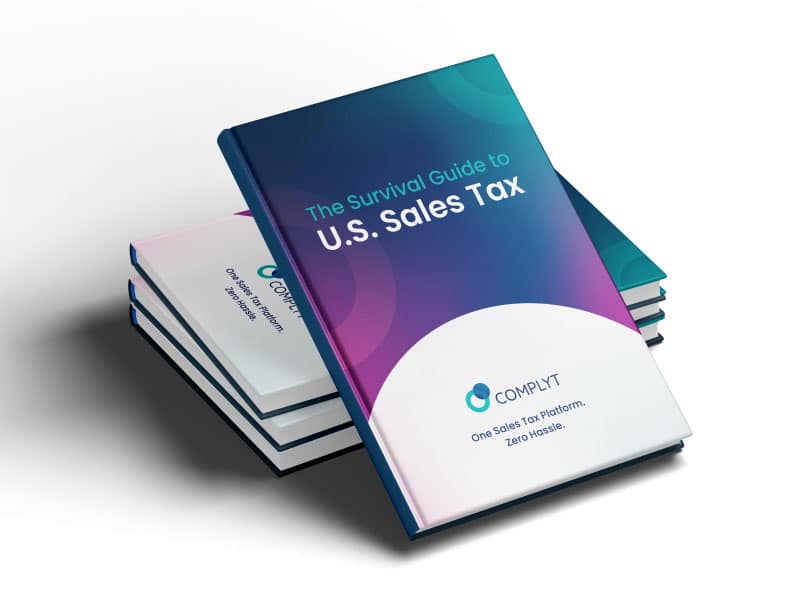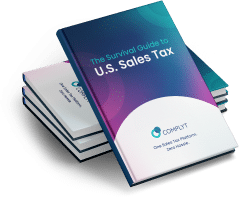What is the sales tax rate in Rhode Island?
The general sales tax rate in Rhode Island is 7%. This rate applies to the sale of most tangible personal property, certain services, and meals in the state. However, some exemptions do exist, including prescription drugs, medical equipment, and certain food items.
It’s important to note that the state does not allow local jurisdictions to impose additional sales taxes, which means the sales tax rate remains uniform across Rhode Island. A welcome change for compliance officers who are tired of double checking complex additional local taxes.
When should your business collect Sales Tax in Rhode Island?
If you operate a business in Rhode Island or have a tax nexus within the state, you are required to collect sales tax on taxable goods and services. It’s as simple as that.
Now a sales tax nexus can be established by having a physical presence (e.g., office, warehouse, employees) or an economic nexus in Rhode Island.
Keep in mind that Rhode Island is a destination-based sales tax state, meaning that the tax rate is determined by the delivery location rather than the location of the seller.
Rhode Island Physical Sales Tax Nexus
You have a physical sales tax nexus in Rhode Island if your business has a physical presence in the state, such as an office, warehouse, or employee. In these cases, you are obligated to collect and remit sales tax on sales made to Rhode Island customers.
Sales Tax Physical Nexus checklist for Rhode Island
Your business may have a physical nexus in Rhode Island if you:
- Have a physical location in the state, such as an office or retail store.
- Store inventory or goods in a warehouse in the state.
- Have an employee or representative conducting business activities in the state.
- Attend trade shows or other events within the state.
If any of these criteria apply to your business, you must collect and remit sales tax on taxable sales to Rhode Island customers.
Rhode Island Economic Nexus Threshold: Revenue, Thresholds and Transactions
Rhode Island follows the economic nexus model, which means out-of-state sellers must collect and remit sales tax if they meet certain revenue or transaction thresholds.
The current economic nexus threshold for Rhode Island is $100,000 in annual gross revenue from sales of tangible personal property, prewritten computer software delivered electronically or by load and leave, vendor-hosted prewritten computer software, or taxable services delivered into Rhode Island; or
200 or more separate sales transactions into the state.
If your business exceeds either of these thresholds, you are required to register for a sales tax permit and collect sales tax on sales made to Rhode Island customers.
Which services are taxable in Rhode Island?
In Rhode Island, most tangible personal property is subject to sales tax. Additionally, some services are also taxable, including:
- Installation, repair, or maintenance services for tangible personal property
- Telecommunications services
- Prewritten computer software
- Rental or leasing of tangible personal property
- Certain digital products and streaming services
Now this isn’t an exhaustive list, and specific exemptions may apply to certain services. So it’s essential to consult the Rhode Island Division of Taxation or a tax professional for more information.
Rhode Island Sales Tax on Products: How to Calculate What Your Business Should be Charging
Calculating sales tax in Rhode Island is relatively straightforward, as the state has a uniform sales tax rate of 7% that applies to most taxable goods and services. Here’s a simple step-by-step guide to calculating sales tax for your Rhode Island business:
Determine if your product or service is taxable: Verify if the product or service you are selling is subject to sales tax in Rhode Island. Some items, such as prescription drugs and certain food products, are exempt from sales tax.
Multiply the taxable sales amount by the sales tax rate: Multiply the total taxable sales amount by the Rhode Island sales tax rate of 7%.
For example, if you sell a product for $100, the sales tax would be $100 x 0.07 = $7.
Add the sales tax amount to the sales price: Add the calculated sales tax amount to the original sales price to get the total amount the customer should pay.
Using the previous example, the total amount charged to the customer would be $100 + $7 = $107.
Record the sales tax collected: Keep accurate records of the sales tax collected for each transaction. This will be necessary when it comes time to file your sales tax returns.
How much is Rhode Island clothing tax?
As of 2023, clothing and footwear in Rhode Island are subject to the state’s standard sales tax rate of 7%. There are no additional local sales taxes, so the rate remains consistent across the state.
Do Rhode Island sales tax holidays affect Rhode Island clothing tax?
Rhode Island occasionally holds sales tax holidays, during which certain items, including clothing and footwear, may be exempt from sales tax. During these events, customers can purchase qualifying items without paying the state’s 7% sales tax. These tax-free periods typically occur once a year and may have specific price limits for eligible items.
Be sure to check the Rhode Island Division of Taxation’s website or consult with a tax professional to stay up-to-date on sales tax holiday dates and eligibility criteria.
Rhode Island Online Sales Tax: Are SaaS and Digital Services Taxable?
In Rhode Island, SaaS (Software as a Service) and other digital services are considered taxable. This means that if you provide SaaS or digital services to Rhode Island customers, you must collect and remit the state’s 7% sales tax.
SaaS Sales Tax Rhode Island: Does my Business Need to Charge Sales Tax for SaaS in Rhode Island?
Yes, businesses providing SaaS services to customers in Rhode Island are required to collect and remit sales tax. This applies to both businesses with a physical presence in the state and those with an economic nexus, as long as they meet the state’s revenue or transaction thresholds.
It’s important to note that Rhode Island SaaS Sales Tax applies to both personal and professional use sales, so SaaS vendors of every ilk need to up their compliance game.
How can a business get a sales tax permit in Rhode Island?
To get a sales tax permit in Rhode Island, follow these steps:
Verify your eligibility: Ensure that your business has a tax nexus in Rhode Island and that you are selling taxable products or services.
Gather necessary information: Prepare your business details, including your EIN or SSN, business name, and contact information.
Apply online or by mail: You can apply for a sales tax permit through the Rhode Island Division of Taxation’s online portal or by submitting a paper application.
Pay any applicable fees: There may be a registration fee associated with obtaining a sales tax permit in Rhode Island.
Receive your permit: After your application is approved, you will receive your sales tax permit. Keep it readily available, as you may be required to display it at your place of business.
Collecting Sales Tax in Rhode Island as a Business
As a business owner in Rhode Island, you are responsible for collecting the appropriate sales tax from your customers on all taxable sales and remitting it to the state. This includes both in-person and online sales, as well as sales made through third-party platforms.
Rhode Island Tax Return Due Dates Explained
In Rhode Island, sales tax returns are typically due monthly, quarterly, or annually, depending on the amount of sales tax your business collects. The specific due dates for each filing period are as follows:
Monthly filers: 20th of the following month
Quarterly filers: 20th of the month following the end of the quarter
Annual filers: January 31st of the following year
What is the required frequency for sales tax returns in Rhode Island?
The frequency at which you are required to file sales tax returns in Rhode Island depends on the amount of sales tax you collect:
Monthly: If you collect more than $200 in sales tax per month.
Quarterly: If you collect between $61 and $200 in sales tax per month.
Annually: If you collect $60 or less in sales tax per month.

